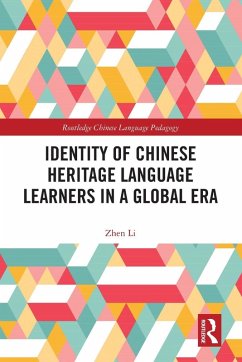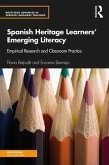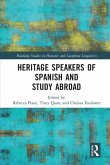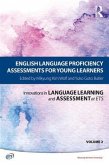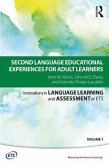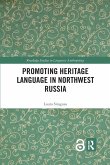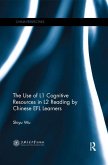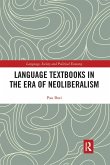Zhen Li
Identity of Chinese Heritage Language Learners in a Global Era
Zhen Li
Identity of Chinese Heritage Language Learners in a Global Era
- Broschiertes Buch
- Merkliste
- Auf die Merkliste
- Bewerten Bewerten
- Teilen
- Produkt teilen
- Produkterinnerung
- Produkterinnerung
Identity of Chinese Heritage Language Learners in a Global Era enriches the current research on heritage language (HL) learner identity by examining how identity is constructed, negotiated and performed in the narratives of university Chinese HL (CHL) learners in Hong Kong.
Andere Kunden interessierten sich auch für
![Spanish Heritage Learners' Emerging Literacy Spanish Heritage Learners' Emerging Literacy]() Flavia BelpolitiSpanish Heritage Learners' Emerging Literacy64,99 €
Flavia BelpolitiSpanish Heritage Learners' Emerging Literacy64,99 €![Heritage Speakers of Spanish and Study Abroad Heritage Speakers of Spanish and Study Abroad]() Heritage Speakers of Spanish and Study Abroad61,99 €
Heritage Speakers of Spanish and Study Abroad61,99 €![English Language Proficiency Assessments for Young Learners English Language Proficiency Assessments for Young Learners]() English Language Proficiency Assessments for Young Learners68,99 €
English Language Proficiency Assessments for Young Learners68,99 €![Second Language Educational Experiences for Adult Learners Second Language Educational Experiences for Adult Learners]() John M. NorrisSecond Language Educational Experiences for Adult Learners61,99 €
John M. NorrisSecond Language Educational Experiences for Adult Learners61,99 €![Promoting Heritage Language in Northwest Russia Promoting Heritage Language in Northwest Russia]() Laura SiragusaPromoting Heritage Language in Northwest Russia64,99 €
Laura SiragusaPromoting Heritage Language in Northwest Russia64,99 €![The Use of L1 Cognitive Resources in L2 Reading by Chinese EFL Learners The Use of L1 Cognitive Resources in L2 Reading by Chinese EFL Learners]() Shiyu WuThe Use of L1 Cognitive Resources in L2 Reading by Chinese EFL Learners63,99 €
Shiyu WuThe Use of L1 Cognitive Resources in L2 Reading by Chinese EFL Learners63,99 €![Language Textbooks in the era of Neoliberalism Language Textbooks in the era of Neoliberalism]() Pau BoriLanguage Textbooks in the era of Neoliberalism64,99 €
Pau BoriLanguage Textbooks in the era of Neoliberalism64,99 €-
-
-
Identity of Chinese Heritage Language Learners in a Global Era enriches the current research on heritage language (HL) learner identity by examining how identity is constructed, negotiated and performed in the narratives of university Chinese HL (CHL) learners in Hong Kong.
Hinweis: Dieser Artikel kann nur an eine deutsche Lieferadresse ausgeliefert werden.
Hinweis: Dieser Artikel kann nur an eine deutsche Lieferadresse ausgeliefert werden.
Produktdetails
- Produktdetails
- Verlag: Routledge
- Seitenzahl: 178
- Erscheinungstermin: 26. August 2024
- Englisch
- Abmessung: 234mm x 156mm x 10mm
- Gewicht: 281g
- ISBN-13: 9781138629318
- ISBN-10: 1138629316
- Artikelnr.: 71234248
- Herstellerkennzeichnung
- Libri GmbH
- Europaallee 1
- 36244 Bad Hersfeld
- gpsr@libri.de
- Verlag: Routledge
- Seitenzahl: 178
- Erscheinungstermin: 26. August 2024
- Englisch
- Abmessung: 234mm x 156mm x 10mm
- Gewicht: 281g
- ISBN-13: 9781138629318
- ISBN-10: 1138629316
- Artikelnr.: 71234248
- Herstellerkennzeichnung
- Libri GmbH
- Europaallee 1
- 36244 Bad Hersfeld
- gpsr@libri.de
Zhen Li is currently Assistant Professor at the Education University of Hong Kong. She taught Chinese as a second language to students from multicultural and multilingual backgrounds in Hong Kong for nearly ten years. Her research interests include identity in cross-cultural contexts, second language education, teacher development, and intercultural communication.
AUTHOR'S NOTE
List of Tables
List of Figures
1 INTRODUCTION
Heritage Language
Definition of HL Learners
Differences between HL and L2 Learners
Research Background
Chinese as a Heritage Language
CHL Speakers as Learners
Means of CHL Learning
Home Language Maintenance
HL Schools
Mixed CFL Classes
The Sociolinguistic Landscape of Hong Kong
The English Landscape
The Changing Linguistic Landscape
University CHL Students in Hong Kong
Rationale for Research
Research Question and Aims
2 UNDERSTANDING HL LEARNER IDENTITY
The Interactional Sociolinguistic Paradigm
The Sociopsychological Paradigm
The Poststructuralist Perspective
Understanding Identity in Narratives
The Intersection between Identity and Storytelling
The Co-construction of Identity in Narrative Interviews
Positioning Theory
An Integrated Framework for Understanding CHL Learner Identity
3 THE RESEARCH PROJECT
Epistemology
Narrative Inquiry
Establishing Rapport and Reciprocity
The Research Setting and Participants
Data Analysis
Trustworthiness
Ethical Issues
4 IDENTITY IN LANGUAGE LEARNING
The Narrative Events
Learning Experiences at Early Life Stages
Chinese Learning in School-based Contexts
Chinese Supplementary Schools Overseas
CFL Classes in Hong Kong K-12 Schools
Class Adaptation for Transnational Learners
Home Language Learning
Reconstructing Learner Identity
Peer Influence
Asian Pop Culture
Career Benefits and Identity-Related Issues
The University CFL classes
Summary
5 IDENTITY IN LANGUAGE USE
The Narrative Events
Multilingual Practices
Language Practices at Home
Language Socialisation at University
CHL Ideologies and Language Hierarchies
Cantonese and Mandarin
Traditional and Simplified Characters
Summary
6 IDENTITY IN SOCIAL EXPERIENCE
The Narrative Events
Before-and-Now: The Western-versus-Chinese
"I Just Feel More Comfortable with a Chinese"
"Culturally I Understand More Where They Are Coming From"
"They Still Live in the Sixties"
Here-and-Now: Local-versus-International
"Definitely the International"
"Like People from the Similar Backgrounds"
"We Are More Outgoing and We Have More Leadership Skills"
"They Are a Bit Stuck"
Summary
7 CONCLUSIONS
Agency and Investment Change in CHL learning
Language Practices in the Context of Superdiversity
Social Membership and Imagined Communities
Implications of the Study
Further Suggestions
REFERENCES
Appendix A: Interview Guide
Appendix B : Transcription Conventions
List of Tables
List of Figures
1 INTRODUCTION
Heritage Language
Definition of HL Learners
Differences between HL and L2 Learners
Research Background
Chinese as a Heritage Language
CHL Speakers as Learners
Means of CHL Learning
Home Language Maintenance
HL Schools
Mixed CFL Classes
The Sociolinguistic Landscape of Hong Kong
The English Landscape
The Changing Linguistic Landscape
University CHL Students in Hong Kong
Rationale for Research
Research Question and Aims
2 UNDERSTANDING HL LEARNER IDENTITY
The Interactional Sociolinguistic Paradigm
The Sociopsychological Paradigm
The Poststructuralist Perspective
Understanding Identity in Narratives
The Intersection between Identity and Storytelling
The Co-construction of Identity in Narrative Interviews
Positioning Theory
An Integrated Framework for Understanding CHL Learner Identity
3 THE RESEARCH PROJECT
Epistemology
Narrative Inquiry
Establishing Rapport and Reciprocity
The Research Setting and Participants
Data Analysis
Trustworthiness
Ethical Issues
4 IDENTITY IN LANGUAGE LEARNING
The Narrative Events
Learning Experiences at Early Life Stages
Chinese Learning in School-based Contexts
Chinese Supplementary Schools Overseas
CFL Classes in Hong Kong K-12 Schools
Class Adaptation for Transnational Learners
Home Language Learning
Reconstructing Learner Identity
Peer Influence
Asian Pop Culture
Career Benefits and Identity-Related Issues
The University CFL classes
Summary
5 IDENTITY IN LANGUAGE USE
The Narrative Events
Multilingual Practices
Language Practices at Home
Language Socialisation at University
CHL Ideologies and Language Hierarchies
Cantonese and Mandarin
Traditional and Simplified Characters
Summary
6 IDENTITY IN SOCIAL EXPERIENCE
The Narrative Events
Before-and-Now: The Western-versus-Chinese
"I Just Feel More Comfortable with a Chinese"
"Culturally I Understand More Where They Are Coming From"
"They Still Live in the Sixties"
Here-and-Now: Local-versus-International
"Definitely the International"
"Like People from the Similar Backgrounds"
"We Are More Outgoing and We Have More Leadership Skills"
"They Are a Bit Stuck"
Summary
7 CONCLUSIONS
Agency and Investment Change in CHL learning
Language Practices in the Context of Superdiversity
Social Membership and Imagined Communities
Implications of the Study
Further Suggestions
REFERENCES
Appendix A: Interview Guide
Appendix B : Transcription Conventions
AUTHOR'S NOTE
List of Tables
List of Figures
1 INTRODUCTION
Heritage Language
Definition of HL Learners
Differences between HL and L2 Learners
Research Background
Chinese as a Heritage Language
CHL Speakers as Learners
Means of CHL Learning
Home Language Maintenance
HL Schools
Mixed CFL Classes
The Sociolinguistic Landscape of Hong Kong
The English Landscape
The Changing Linguistic Landscape
University CHL Students in Hong Kong
Rationale for Research
Research Question and Aims
2 UNDERSTANDING HL LEARNER IDENTITY
The Interactional Sociolinguistic Paradigm
The Sociopsychological Paradigm
The Poststructuralist Perspective
Understanding Identity in Narratives
The Intersection between Identity and Storytelling
The Co-construction of Identity in Narrative Interviews
Positioning Theory
An Integrated Framework for Understanding CHL Learner Identity
3 THE RESEARCH PROJECT
Epistemology
Narrative Inquiry
Establishing Rapport and Reciprocity
The Research Setting and Participants
Data Analysis
Trustworthiness
Ethical Issues
4 IDENTITY IN LANGUAGE LEARNING
The Narrative Events
Learning Experiences at Early Life Stages
Chinese Learning in School-based Contexts
Chinese Supplementary Schools Overseas
CFL Classes in Hong Kong K-12 Schools
Class Adaptation for Transnational Learners
Home Language Learning
Reconstructing Learner Identity
Peer Influence
Asian Pop Culture
Career Benefits and Identity-Related Issues
The University CFL classes
Summary
5 IDENTITY IN LANGUAGE USE
The Narrative Events
Multilingual Practices
Language Practices at Home
Language Socialisation at University
CHL Ideologies and Language Hierarchies
Cantonese and Mandarin
Traditional and Simplified Characters
Summary
6 IDENTITY IN SOCIAL EXPERIENCE
The Narrative Events
Before-and-Now: The Western-versus-Chinese
"I Just Feel More Comfortable with a Chinese"
"Culturally I Understand More Where They Are Coming From"
"They Still Live in the Sixties"
Here-and-Now: Local-versus-International
"Definitely the International"
"Like People from the Similar Backgrounds"
"We Are More Outgoing and We Have More Leadership Skills"
"They Are a Bit Stuck"
Summary
7 CONCLUSIONS
Agency and Investment Change in CHL learning
Language Practices in the Context of Superdiversity
Social Membership and Imagined Communities
Implications of the Study
Further Suggestions
REFERENCES
Appendix A: Interview Guide
Appendix B : Transcription Conventions
List of Tables
List of Figures
1 INTRODUCTION
Heritage Language
Definition of HL Learners
Differences between HL and L2 Learners
Research Background
Chinese as a Heritage Language
CHL Speakers as Learners
Means of CHL Learning
Home Language Maintenance
HL Schools
Mixed CFL Classes
The Sociolinguistic Landscape of Hong Kong
The English Landscape
The Changing Linguistic Landscape
University CHL Students in Hong Kong
Rationale for Research
Research Question and Aims
2 UNDERSTANDING HL LEARNER IDENTITY
The Interactional Sociolinguistic Paradigm
The Sociopsychological Paradigm
The Poststructuralist Perspective
Understanding Identity in Narratives
The Intersection between Identity and Storytelling
The Co-construction of Identity in Narrative Interviews
Positioning Theory
An Integrated Framework for Understanding CHL Learner Identity
3 THE RESEARCH PROJECT
Epistemology
Narrative Inquiry
Establishing Rapport and Reciprocity
The Research Setting and Participants
Data Analysis
Trustworthiness
Ethical Issues
4 IDENTITY IN LANGUAGE LEARNING
The Narrative Events
Learning Experiences at Early Life Stages
Chinese Learning in School-based Contexts
Chinese Supplementary Schools Overseas
CFL Classes in Hong Kong K-12 Schools
Class Adaptation for Transnational Learners
Home Language Learning
Reconstructing Learner Identity
Peer Influence
Asian Pop Culture
Career Benefits and Identity-Related Issues
The University CFL classes
Summary
5 IDENTITY IN LANGUAGE USE
The Narrative Events
Multilingual Practices
Language Practices at Home
Language Socialisation at University
CHL Ideologies and Language Hierarchies
Cantonese and Mandarin
Traditional and Simplified Characters
Summary
6 IDENTITY IN SOCIAL EXPERIENCE
The Narrative Events
Before-and-Now: The Western-versus-Chinese
"I Just Feel More Comfortable with a Chinese"
"Culturally I Understand More Where They Are Coming From"
"They Still Live in the Sixties"
Here-and-Now: Local-versus-International
"Definitely the International"
"Like People from the Similar Backgrounds"
"We Are More Outgoing and We Have More Leadership Skills"
"They Are a Bit Stuck"
Summary
7 CONCLUSIONS
Agency and Investment Change in CHL learning
Language Practices in the Context of Superdiversity
Social Membership and Imagined Communities
Implications of the Study
Further Suggestions
REFERENCES
Appendix A: Interview Guide
Appendix B : Transcription Conventions

